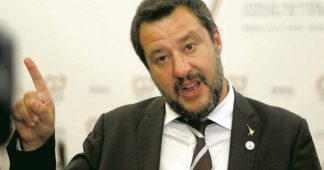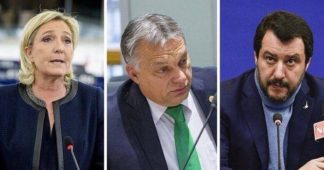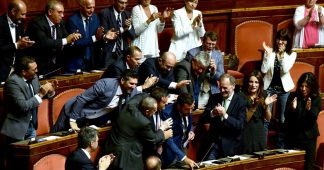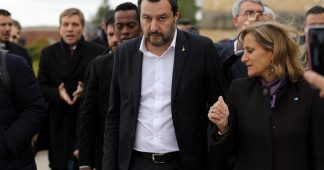By Eleonora Vasques and Théo Bourgery
Jul 4, 2022
Ideological divisions between the French National Rally (Rassemblement National) and the Italian League Party (Lega) over the ‘normalisation’ of the latter’s politics are undermining far-right unity, sources told EURACTIV.
The evolution of the League as a more centre-right party rather than a nationalist far-right force and its involvement in the Italian government coalition led by the pro-European Mario Draghi is one of the reasons behind the division, according to sources in the far-right Identity and Democracy group (ID) within the European Parliament.
The ID brings together ten far-right European parties – including the National Rally, the German Alternative für Deutschland (AfD) and the League, the group’s biggest party with 24 MEPs that also holds its presidency.
“The League is going through a normalisation process, and we do not agree on anything anymore,” ID sources told EURACTIV.
The last thirty years have seen the League evolve from an Italian secessionist party in the 1990s to an anti-European force in the 2010s under Matteo Salvini’s leadership.
However, League’s attitude towards Europe is sharply changing, as its main political message shifted from leaving the bloc to calling for more sovereign member states but remaining under the EU umbrella.
This change was more evident when the party joined former European Central Bank president Draghi’s government coalition in February 2021, receiving three ministerial posts.
ID sources told EURACTIV that being part of Draghi’s government has forced Salvini’s party to soften its stances on policy matters.
Absence of vote cohesion
According to VoteWatch data, Salvini’s League strayed away from original policy positions on critical issues, especially Russia’s invasion of Ukraine.
Historically “one of the most accommodating [far right parties] towards Russia,” the League was assertive in condemning the invasion, a report by the think tank found.
Based on 280 votes, it found Lega to be more assertive towards Russia than most ID members – especially the National Rally, which remains pro-Russia.
Overall, group cohesion is also at an all-time low on other policy files. ID MEPs voted the same way only 52% of the time on foreign and security policy matters. It goes up to 56% for economic and monetary issues and 64% for environmental and public health policies. The average cohesion of other political groups is 90% for the same policy areas.
That said, one policy issue sees ideological unity; migration. “Our group is strongly opposed to the Migration Pact,” ID’s French delegation President Jean-Paul Garraud told EURACTIV. “Cohesion levels near 100% on this policy matter.”
“Things are going well”
Despite these differences, both the League and RN insist all is well.
“Things are going well”, Gunnar Beck, ID group vice president and a member of the German far-right Alternative für Deutschland (AfD), told EURACTIV at a press conference following a two-day meeting with ID members in Paris last week. “Despite our differences, we all agree on the principle of national sovereignty.”
League party head of delegation at the European Parliament Marco Campomenosi underlined the excellent relations between themselves and Le Pen’s party.
“Within our political group, made up of different souls, there is no tension or friction, just normal political dialectics,” the League’s Marco Zanni, who also holds the presidency of the ID group, told EURACTIV.
But in private, some feel uneasy. “I’m not even sure what ID stands for anymore,” sighs an MEP belonging to the group. “Bar migration policy, the ideological coherence is no longer there.”
We remind our readers that publication of articles on our site does not mean that we agree with what is written. Our policy is to publish anything which we consider of interest, so as to assist our readers in forming their opinions. Sometimes we even publish articles with which we totally disagree, since we believe it is important for our readers to be informed on as wide a spectrum of views as possible.










